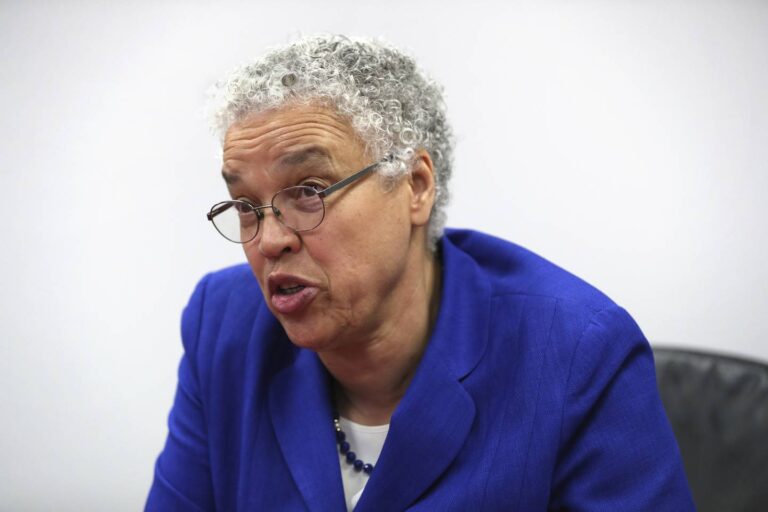Starting this fall, hundreds of residents across Cook County will receive a note in the mail bearing a simple message: Your medical debt is taken care of.
Debtors will not need to apply to get the relief, nor will that debt forgiveness count against them when they file their taxes.
Advertisement
Picking up the tab: Cook County government, which will pay the nonprofit group RIP Medical Debt $12 million over the next three years to buy medical debt accumulated at hospitals across Cook County for pennies on the dollar.
Rather than attempt to collect on that debt, the group will forgive it and work to have that debt erased from credit reports. Because medical debt can often be purchased for pennies on the dollar compared to the original charge, the county hopes to abolish $1 billion in medical debts that could date back years.
Advertisement
The money comes from the county’s pool of $1 billion in American Rescue Plan Act funds. The program must still be approved by the Cook County Board, and local hospitals must consent to participate, but county board president Toni Preckwinkle and partners in the project expect both to happen.
So does the White House: Preckwinkle will be recognized alongside other government officials at a Thursday event with Gene Sperling, President Biden’s ARP coordinator and senior adviser, for their creative use of ARP dollars.
Alongside the county’s $42 million guaranteed income program and plans to fund new behavioral health offerings at county-run hospitals and clinics, Preckwinkle told the Tribune she hopes the medical debt abolition program will help improve families’ long-term economic security and encourage people to seek out medical care free from worries about being pursued for past-due bills.
Eligible individuals will be Cook County residents who received healthcare on or after Mar. 30, 2020, have a household income less than four times the federal poverty level, or have medical debts that are 5% or more of their annual income. Debt accounts will be anywhere from 18 months to 7 or more years old.Account balances will have been written off to bad debt, and hospitals consider the accounts to be dormant. RIP plans to buy that debt directly from hospitals in bundles.
Creditors like hospitals, ambulance operators or private doctors write off debts after a few years and put them up for sale to third-party collection agencies, who can buy millions of dollars worth of charges at a fraction of the original cost in the hopes of collecting on at least some past-due bills. The older the debt, the cheaper it is to buy. Rather than collect on those debts, RIP Medical Debt uses donations to forgive them.
Medical debt is a stubborn issue nationally: It’s the leading contributor to personal bankruptcies. Somewhere between 17 and 35% of American adults have medical debt, according to the Consumer Financial Protection Bureau, and Black and Hispanic people, young adults and low-income individuals have higher rates than the national average.
“Medical debt can also lead people to avoid medical care, develop physical and mental health problems, and face adverse financial consequences like lawsuits, wage and bank account garnishment, home liens, and bankruptcy,” the CFPB’s recent report said. “Given the widespread impact of COVID-19, addressing medical debt is an urgent priority.”
Sign up for The Spin to get the top stories in politics delivered to your inbox weekday afternoons.
Advertisement
RIP, which was founded by two former debt collection executives, has worked in Chicago before. In 2019, a network of area churches tapped them to wipe out more than $5.3 million in debt for close to 6,000 residents in Englewood, Roseland, Auburn-Gresham, Washington Heights and West Pullman.
To their knowledge, Cook County is the only government using their federal COVID-19 relief money this way, county officials and RIP President and CEO Allison Sesso said. Aside from a $50 million donation from McKenzie Scott, the billionaire philanthropist, this is the single largest infusion her organization has received.
Sesso said her group partners with hospitals to receive files of their debtors, which are then “ingested into our debt engine. We pair it with data that we purchase from an accrediting agency like TransUnion. That gives us the information whether or not the people are eligible,” she says. That can then be further narrowed to zip codes within Cook County. “What I like most about our model is that it really is blind to any other attributes of the individual. It really is focused on just their income and whether or not we have access to their debt.”
The group made national headlines in 2016, when TV host John Oliver partnered with them after purchasing $15 million of medical debt. Oliver’s stunt followed a long segment on the predatory nature of many debt buyers, who can attempt to collect on past-due bills long after customers or patients are legally responsible for them.
By 2021, RIP had abolished $2.7 billion worth of debt for 1.3 million people, according to its annual report, and purchased debt directly from 12 healthcare providers.
The two hospitals Cook County runs — Stroger and Provident — are not eligible to participate in the county’s program due to ARPA spending restrictions, county officials say. But RIP will use privately fundraised dollars “to support any debt relief” associated with the Cook County hospitals, Sesso said.
Advertisement
“We’re aiming for late fall to push this out,” Preckwinkle Deputy Chief of Staff Otis Story said. “So good news is on the horizon.”







